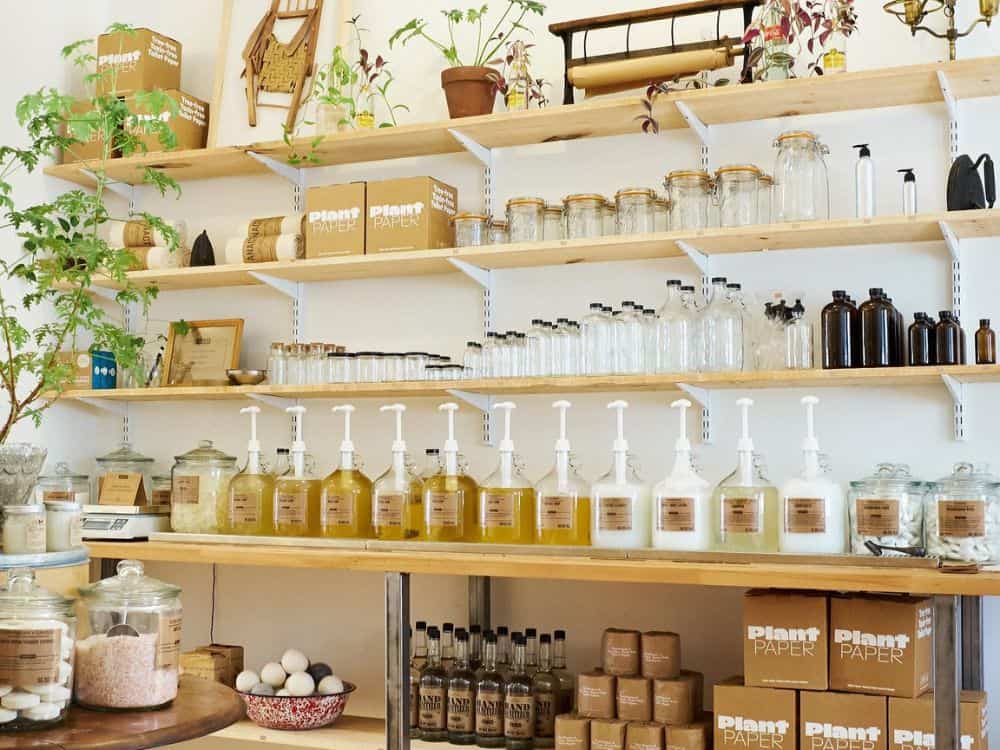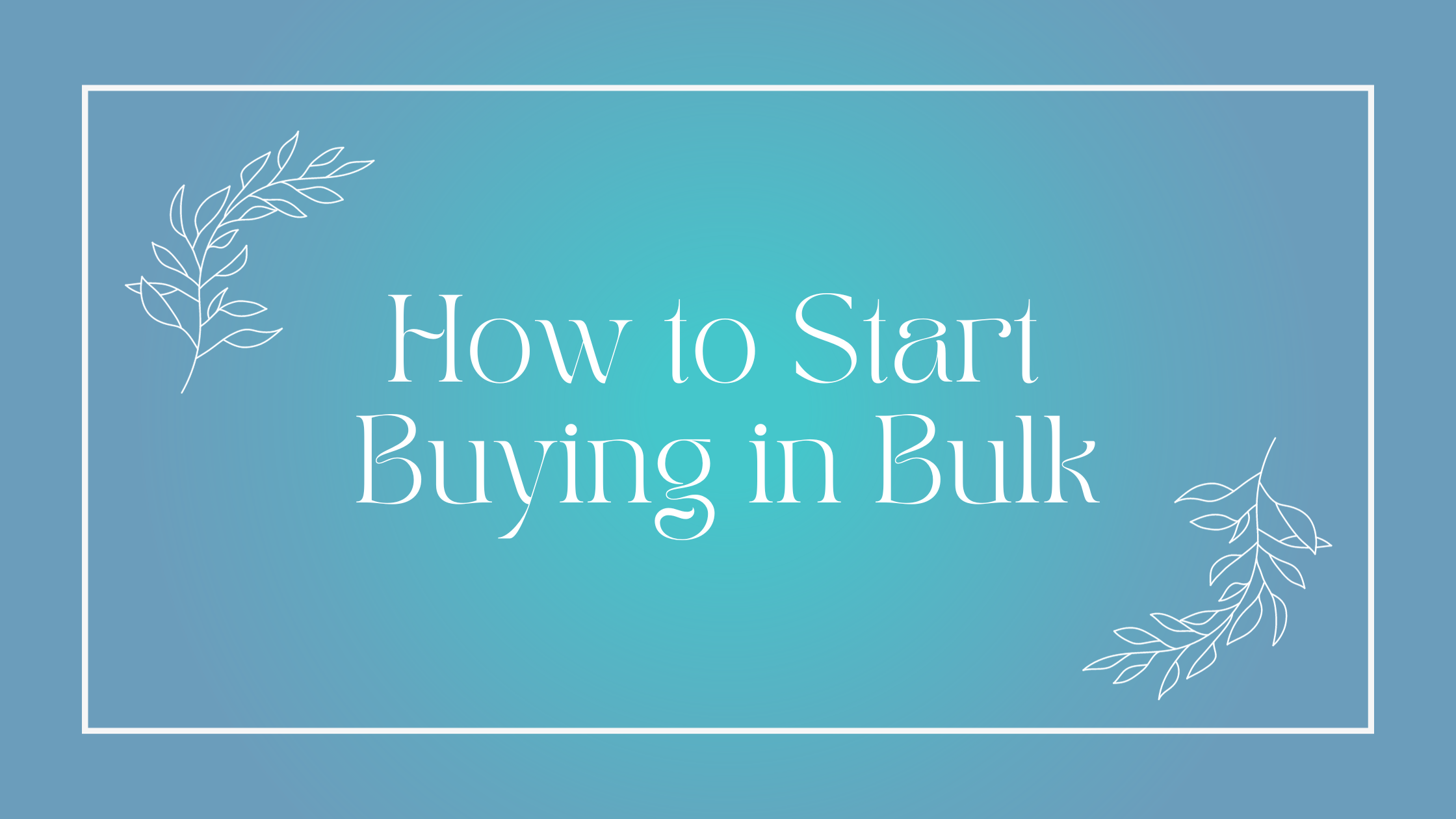When I first started out on my low-waste journey, I was confronted with the idea of buying in bulk. I didn’t really understand what that meant or how to go about it at the time. Buying in bulk can feel quite confusing at first. What does buying in bulk really mean? Do you have to bring your own containers into a chain grocery store? Is it true that buying in bulk quantities is actually MORE expensive? Is it really that beneficial for the environment?
We here at Coast to Coast hope to answer these questions for you and help you out on your way to being a bulk buying aficionado.
1. What is Bulk Buying?
Buying in bulk often means buying in larger quantities for a lower price than the overall cost would be per item. For example, buying a larger quantity of paper towels for much cheaper than what you would have paid to purchase each roll individually.

But for environmental purposes, bulk buying can take on a slightly different meaning. It has often been coupled with the idea of zero-waste or low-waste shopping. Wherein you fill up glass jars (or your choice of refillable container) with the foods stored in the bulk bin section of a grocery store as opposed to buying each food item in its pre-packaged form. There are two motivations in doing this:
- It cuts down on the plastic and packaging waste being used by consumers.
- It can often times be a much cheaper alternative to buying pre-packaged foods.
2. What do I need to start bulk buying at my local grocery store?
If you’re hoping to start the process of switching to bulk foods there are a few ways to get into the process. Most grocery stores will provide plastic bags for you in the bulk section. These can be great for trying out new foods are getting used to the concept of buying in bulk (try to reuse the same plastic bags to cut down on waste).
Don't be afraid to ask the employees at your local store what the policy is for bringing in your own containers or glass jars for the bulk bins. When I first started buying from the bulk section I wanted to see if there were other ways I could cut down on waste, so I went to the bakery and asked if I could bring in a fabric bag I had sewn myself for bread instead of the plastic bags they came in. The staff was really accommodating, and were more than happy to work with me (some even asked for their own bread bags). The deli was the next target, I asked if it was alright for me to bring in a plastic container to have my deli items put in instead of a plastic bag, and the staff there were also happy to do that for me.

It's important to note that not every grocery chain will have the same policies, so keep in mind that not every store is going to be able to accommodate you in the same way. Additionally, policies may have changed since the COVID-19 Pandemic, for instance, I'm not always allowed to bring in my own containers if the employees have to be cautious for health reasons.
Being friendly and respectful of your local store's employees can get you a long way if you're wanting to expand your bulk buying habits.
3. Bulk Stores
If you'd rather skip the chain grocery, or if you discover that not all the household items you need are available in bulk, try looking for local bulk food stores, co-ops, and refilleries in your area. These stores are great for household cleaners, detergents, deodorants, and soaps. They tend to carry liquid products that you might not be able to find at a chain store.

Ask the staff about how to fill up on whatever products you're in the search for. Each store may vary on whether you are able to bring in your own containers or if they have containers available for you to purchase. Have fun looking around and discovering all the zero-waste bulk options you may not have even known were available!
4. Is Buying in Bulk actually MORE expensive?
Fortunately, more often than not, buying in bulk is a cheaper option. Buying more product at a lower per unit cost saves you money as a consumer.
I remember the first time I went to a bulk foods store and I was genuinely shocked at how affordable all the products were. I was spending pennies on the dollar compared to what I was used to.
It can vary of course depending on what types of foods or products you're purchasing, so make sure to be aware of how much product you're getting before filling up your container.
It can be hard to be sure of prices when you go from simply looking at the price tag of an item to calculating out the weight and price. It can also be a little daunting and confusing if you find going to the grocery store to be low on your favorites list.
There is a short learning curve when it comes to buying in bulk and that does include learning how much produce you need and the subsequent costs for each item.
Thankfully over time (and a short learning curve) you'll realize which containers are best for laundry detergent vs granola. Having containers dedicated for certain products makes it easy to know what that product will end up costing you, since bulk foods are priced by weight.
5. Is Bulk Buying Really Beneficial for the Environment?
The short answer is yes.
Buying from the bulk section or from bulk stores means less packaging and less waste, plain and simple! Refilling an existing container means fewer containers need to be produced and subsequently thrown away.
We throw away about 391 metric tons of plastic every year. That's an almost incomprehensible amount of plastic waste. By using zero and low-waste shopping methods, you are actively reducing that waste. All the little steps and actions we take in our everyday lives to reduce our consumption and waste, snowballs over time into a substantial impact!
We hope that you have a few helpful tips to get you started on your bulk buying journey! And if you're an experienced bulk buyer, let us know any helpful tips you have for us in the comments below!


Comments
Thanks for the great information. We can buy very few things in bulk here. It is not always economical because of where you live…. do you know of any sources that ship bulk goods?